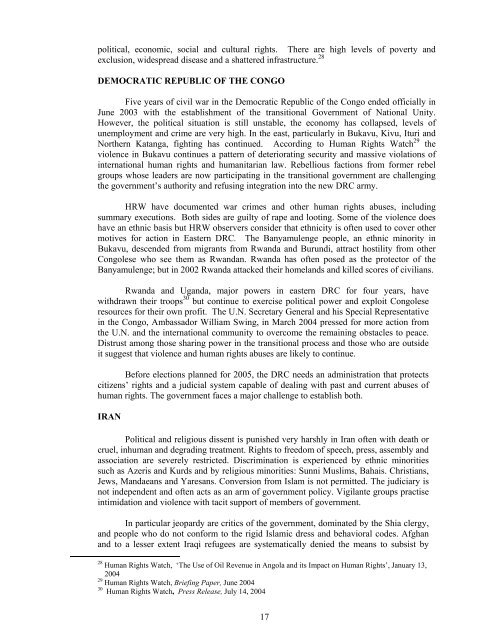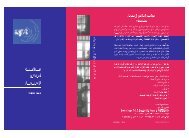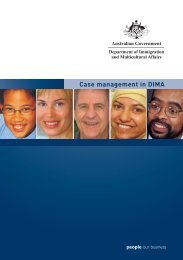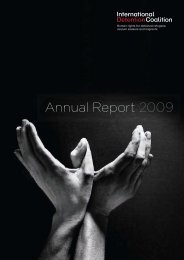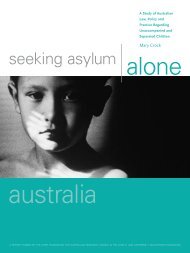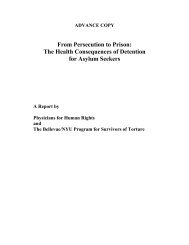DEPORTED TO DANGER - Edmund Rice Centre
DEPORTED TO DANGER - Edmund Rice Centre
DEPORTED TO DANGER - Edmund Rice Centre
You also want an ePaper? Increase the reach of your titles
YUMPU automatically turns print PDFs into web optimized ePapers that Google loves.
political, economic, social and cultural rights. There are high levels of poverty andexclusion, widespread disease and a shattered infrastructure. 28DEMOCRATIC REPUBLIC OF THE CONGOFive years of civil war in the Democratic Republic of the Congo ended officially inJune 2003 with the establishment of the transitional Government of National Unity.However, the political situation is still unstable, the economy has collapsed, levels ofunemployment and crime are very high. In the east, particularly in Bukavu, Kivu, Ituri andNorthern Katanga, fighting has continued. According to Human Rights Watch 29 theviolence in Bukavu continues a pattern of deteriorating security and massive violations ofinternational human rights and humanitarian law. Rebellious factions from former rebelgroups whose leaders are now participating in the transitional government are challengingthe government’s authority and refusing integration into the new DRC army.HRW have documented war crimes and other human rights abuses, includingsummary executions. Both sides are guilty of rape and looting. Some of the violence doeshave an ethnic basis but HRW observers consider that ethnicity is often used to cover othermotives for action in Eastern DRC. The Banyamulenge people, an ethnic minority inBukavu, descended from migrants from Rwanda and Burundi, attract hostility from otherCongolese who see them as Rwandan. Rwanda has often posed as the protector of theBanyamulenge; but in 2002 Rwanda attacked their homelands and killed scores of civilians.Rwanda and Uganda, major powers in eastern DRC for four years, havewithdrawn their troops 30 but continue to exercise political power and exploit Congoleseresources for their own profit. The U.N. Secretary General and his Special Representativein the Congo, Ambassador William Swing, in March 2004 pressed for more action fromthe U.N. and the international community to overcome the remaining obstacles to peace.Distrust among those sharing power in the transitional process and those who are outsideit suggest that violence and human rights abuses are likely to continue.Before elections planned for 2005, the DRC needs an administration that protectscitizens’ rights and a judicial system capable of dealing with past and current abuses ofhuman rights. The government faces a major challenge to establish both.IRANPolitical and religious dissent is punished very harshly in Iran often with death orcruel, inhuman and degrading treatment. Rights to freedom of speech, press, assembly andassociation are severely restricted. Discrimination is experienced by ethnic minoritiessuch as Azeris and Kurds and by religious minorities: Sunni Muslims, Bahais. Christians,Jews, Mandaeans and Yaresans. Conversion from Islam is not permitted. The judiciary isnot independent and often acts as an arm of government policy. Vigilante groups practiseintimidation and violence with tacit support of members of government.In particular jeopardy are critics of the government, dominated by the Shia clergy,and people who do not conform to the rigid Islamic dress and behavioral codes. Afghanand to a lesser extent Iraqi refugees are systematically denied the means to subsist by28 Human Rights Watch, ‘The Use of Oil Revenue in Angola and its Impact on Human Rights’, January 13,200429 Human Rights Watch, Briefing Paper, June 200430 Human Rights Watch, Press Release, July 14, 200417


